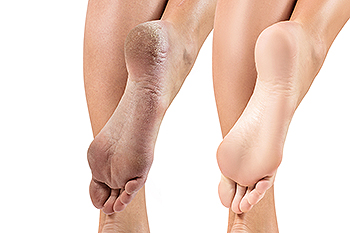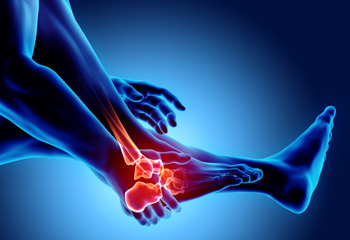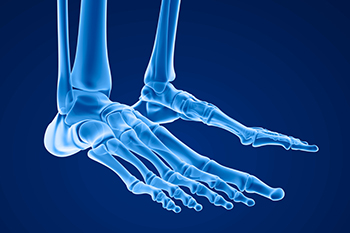November 2023
Health Implications of Cracked Heels

Cracked heels are not merely a cosmetic concern, their impact can extend beyond the surface, and may affect overall foot health and well-being. These painful fissures in the skin create an entry point for bacteria, increasing the risk of infections. As the cracks deepen, they can lead to bleeding and expose sensitive tissues, causing discomfort and hindering mobility. In severe cases, untreated cracked heels may contribute to balance issues, potentially increasing the risk of falls, particularly in older individuals. The pain associated with cracked heels can alter gait patterns, placing undue stress on other joints, such as the knees and hips. Moreover, the constant pressure on the feet can lead to chronic inflammation, exacerbating conditions such as plantar fasciitis. Addressing cracked heels involves more than cosmetic care, it is a vital aspect of maintaining overall foot health and preventing potential complications that can impact one's daily life and mobility. If you have cracked heels, it is suggested that you schedule an appointment with a podiatrist who can offer prescribed medication as an effective treatment method.
If the skin on your feet starts to crack, you may want to see a podiatrist to find treatment. If you have any concerns, contact one of our podiatrists from Family Foot Care. Our doctors can provide the care you need to keep you pain-free and on your feet.
Cracked Heels
It is important to moisturize your cracked heels in order to prevent pain, bleeding, and infection. The reason cracked heels form is because the skin on the foot is too dry to support the immense pressure placed on them. When the foot expands, the dry skin on the foot begins to split.
Ways to Help Heal Them
- Invest in a good foot cream
- Try Using Petroleum Jelly
- Ease up on Soaps
- Drink Plenty of Water
Ways to Prevent Cracked Heels
- Moisturize After Showering
- Skip a Shower
- Keep Shower Water Lukewarm
- Don’t Scrub Your Feet
If you are unsure how to proceed in treating cracked heels, seek guidance from a podiatrist. Your doctor will help you with any questions or information you may need.
If you have any questions, please feel free to contact our offices located in Valatie and Albany, NY . We offer the newest diagnostic and treatment technologies for all your foot care needs.
Understanding the Causes of Nocturnal Foot Pain

If you have ever experienced the discomfort of foot pain that strikes at night, you are not alone. This phenomenon can be both puzzling and distressing, disrupting precious sleep. There are several potential reasons why your feet can ache during the nighttime hours. One common cause of nighttime foot pain is plantar fasciitis, a condition that involves inflammation of the thick band of tissue that runs along the bottom of your foot. This inflammation can become more pronounced when you rest, leading to pain when you try to sleep. Another possible culprit is neuropathy, a condition characterized by nerve damage. Neuropathy can cause tingling, burning, and sharp pains in the feet, often worsening at night. Diabetes and other underlying medical conditions can contribute to the development of neuropathy. Restless Leg Syndrome, or RLS, is yet another contributor to nocturnal foot pain. Those with RLS experience an irresistible urge to move their legs, often accompanied by uncomfortable sensations like tingling or aching in the feet. This can disrupt sleep and lead to foot discomfort. Ii you are experiencing nighttime foot pain, it is suggested that you consult a podiatrist, who can identify the underlying cause and offer appropriate treatment methods.
Foot Pain
Foot pain can be extremely painful and debilitating. If you have a foot pain, consult with one of our podiatrists from Family Foot Care. Our doctors will assess your condition and provide you with quality foot and ankle treatment.
Causes
Foot pain is a very broad condition that could be caused by one or more ailments. The most common include:
- Bunions
- Hammertoes
- Plantar Fasciitis
- Bone Spurs
- Corns
- Tarsal Tunnel Syndrome
- Ingrown Toenails
- Arthritis (such as Gout, Rheumatoid, and Osteoarthritis)
- Flat Feet
- Injury (from stress fractures, broken toe, foot, ankle, Achilles tendon ruptures, and sprains)
- And more
Diagnosis
To figure out the cause of foot pain, podiatrists utilize several different methods. This can range from simple visual inspections and sensation tests to X-rays and MRI scans. Prior medical history, family medical history, and any recent physical traumatic events will all be taken into consideration for a proper diagnosis.
Treatment
Treatment depends upon the cause of the foot pain. Whether it is resting, staying off the foot, or having surgery; podiatrists have a number of treatment options available for foot pain.
If you have any questions, please feel free to contact our offices located in Valatie and Albany, NY . We offer the newest diagnostic and treatment technologies for all your foot care needs.
Stress Fractures Relief Methods

Stress fractures typically affect various areas of the foot and leg, including the metatarsals, calcaneus, navicular, and fibula bones. The most common type is a metatarsal stress fracture, sometimes referred to as a march fracture because it is prevalent among soldiers and hikers. MRI scans or bone scans may be needed to identify a stress fracture, since X-rays are not always sensitive enough to detect them early. Stress fractures in the foot develop when the foot is subjected to repetitive overloading, particularly during activities such as running, football, tennis, gymnastics, and basketball. Relief from stress fractures begins by ceasing the activity that caused them. After seeing a podiatrist for a diagnosis, treatment options may include special walking shoes or braces to reduce the force on the foot. In severe cases, a splint or cast may be required. Crutches can help keep weight off the affected foot for a few weeks, after which controlled weight bearing can stimulate healing. If you suspect you have endured a stress fracture in your foot, it is suggested that you consult a podiatrist for an exam and customized treatment plan.
Activities where too much pressure is put on the feet can cause stress fractures. To learn more, contact one of our podiatrists from Family Foot Care. Our doctors can provide the care you need to keep your pain free and on your feet.
Dealing with Stress Fractures of the Foot and Ankle
Stress fractures occur in the foot and ankle when muscles in these areas weaken from too much or too little use. The feet and ankles then lose support when walking or running from the impact of the ground. Since there is no protection, the bones receive the full impact of each step. Stress on the feet can cause cracks to form in the bones, thus creating stress fractures.
What Are Stress Fractures?
Stress fractures occur frequently in individuals whose daily activities cause great impact on the feet and ankles. Stress factors are most common among:
- Runners
- People affected with Osteoporosis
- Tennis or basketball players
- Gymnasts
- High impact workouts
Symptoms
Pain from the fractures occur in the area of the fractures and can be constant or intermittent. It will often cause sharp or dull pain with swelling and tenderness. Engaging in any kind of activity which involves high impact will aggravate pain.
If you have any questions please feel free to contact our offices located in Valatie and Albany, NY . We offer the newest diagnostic and treatment technologies for all your foot and ankle needs.
Plantar Warts Can Be Treated!
Foot Deformities and High Heels

High heels, while often a stylish footwear choice, can lead to foot problems for many women. Regularly wearing these types of shoes can result in the feet becoming flatter, causing the big toe to deviate abnormally, either inwards or outwards. This is not just limited to the big toe, as the little toe can also be affected, tending to bend inwards. The altered posture and pressure points created by the elevated heel height can lead to various deformities. For women who frequently choose to wear high heels, it is essential to recognize the potential long-term effect on their foot health. If you enjoy wearing high heels, it is suggested that you make an appointment with a podiatrist who can offer guidance on how to wear heels in a way that minimizes harm. They can also suggest alternative fashionable footwear options that provide a better balance between fashion and foot health. Taking these precautions may help to prevent long-term foot issues.
High heels have a history of causing foot and ankle problems. If you have any concerns about your feet or ankles, contact one of our podiatrists from Family Foot Care. Our doctors can provide the care you need to keep you pain-free and on your feet.
Effects of High Heels on the Feet
High heels are popular shoes among women because of their many styles and societal appeal. Despite this, high heels can still cause many health problems if worn too frequently.
Which Parts of My Body Will Be Affected by High Heels?
- Ankle Joints
- Achilles Tendon – May shorten and stiffen with prolonged wear
- Balls of the Feet
- Knees – Heels cause the knees to bend constantly, creating stress on them
- Back – They decrease the spine’s ability to absorb shock, which may lead to back pain. The vertebrae of the lower back may compress.
What Kinds of Foot Problems Can Develop from Wearing High Heels?
- Corns
- Calluses
- Hammertoe
- Bunions
- Morton’s Neuroma
- Plantar Fasciitis
How Can I Still Wear High Heels and Maintain Foot Health?
If you want to wear high heeled shoes, make sure that you are not wearing them every day, as this will help prevent long term physical problems. Try wearing thicker heels as opposed to stilettos to distribute weight more evenly across the feet. Always make sure you are wearing the proper shoes for the right occasion, such as sneakers for exercising. If you walk to work, try carrying your heels with you and changing into them once you arrive at work. Adding inserts to your heels can help cushion your feet and absorb shock. Full foot inserts or metatarsal pads are available.
If you have any questions please feel free to contact our offices located in Valatie and Albany, NY . We offer the newest diagnostic and treatment technologies for all your foot and ankle needs.




